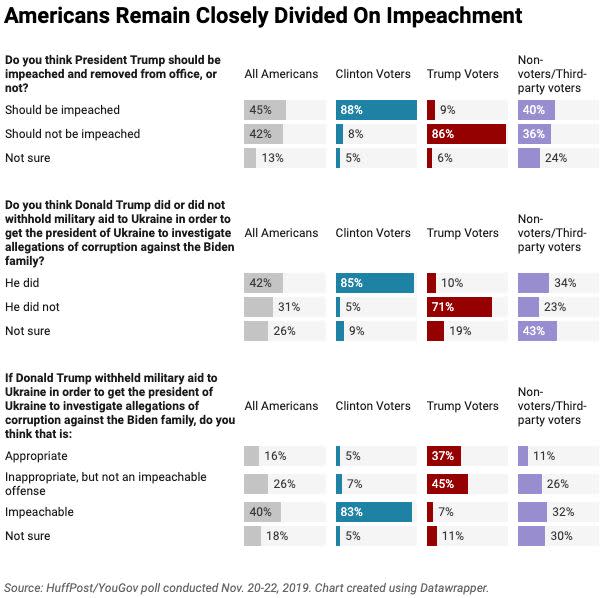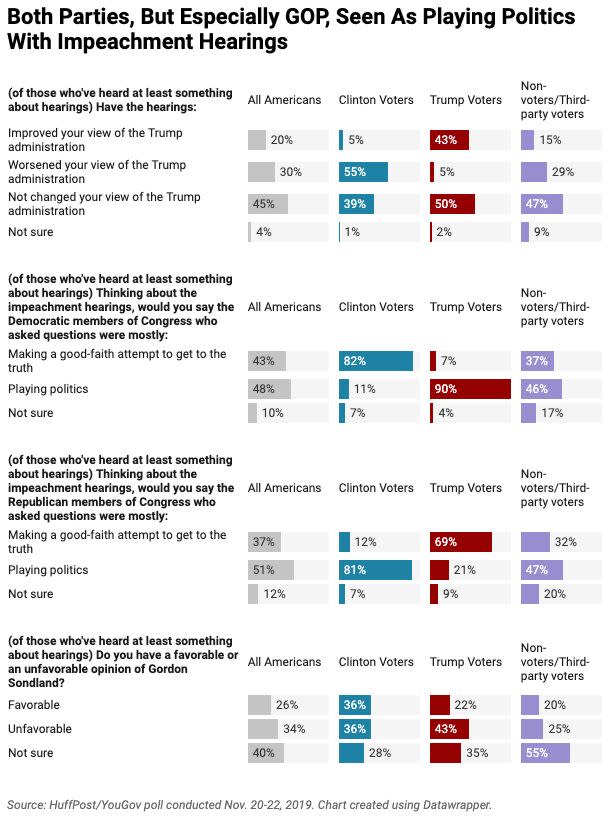People Are Doubling Down On Their Opinions On Impeachment, Poll Finds

Days of televised impeachment hearings have left Americans largely dug into their original opinions, a new HuffPost/YouGov poll finds, dashing Democrats’ hopes that the testimony might finally splinter the president’s base of support and Republicans’ predictions that the hearings would backfire on their opponents.
The poll was conducted starting Wednesday night, after a day of House hearings during which Gordon Sondland, the American ambassador to the European Union, testified that President Donald Trump engaged in a quid pro quo with aid to Ukraine. Republicans largely dismissed that testimony as meaningless, while Democrats heralded it as a bombshell ― a split that mirrors broader public opinion.
The public is nearly evenly split on whether Trump should be removed from office, the survey found, with 45% saying he should and 42% that he should not. That’s identical to the results of a survey taken a week earlier, and within the range of 44% to 48% shown in HuffPost/YouGov polling since late September. (Contrary to Trump’s tweet on Monday morning, polls do not show impeachment support “dropping like a rock,” although taken as a whole, they do suggest it has leveled off and may have ticked down from its peak.)
Americans say, 42% to 31%, that they think Trump withheld military aid to Ukraine in order to get the Ukrainian president to investigate the Biden family. Just 16% say doing so would be appropriate, with 26% calling it inappropriate but not impeachable, and 40% saying it’s an impeachable offense. The responses were little changed from the previous survey.

Underlying those numbers is a familiar political divide. People who voted for Trump’s rival in 2016 remain staunchly against him. Some expressed frustration that the impeachment hearings haven’t had a more immediate effect in changing minds.
“I felt that if the Republicans actually listened, they would also want to impeach & remove Trump,” wrote a woman in Texas who voted for Hillary Clinton. Mused another Clinton voter from Ohio, “I kept wondering if the Democrats & Republicans were listening to the same testimonies.”
Trump’s base of supporters, however, shows no signs of turning on him en masse.
“I thought the hearing is a ‘he said-she said’ and as many would say, a witch hunt to get President Trump and such a waste of our government’s time, money, and resources,” wrote a Trump voter from Arizona, who wasn’t sure if the president withheld aid from Ukraine and said doing so would be inappropriate, but not impeachable.
Add in the modestly negative appraisals from the rest of the public, and opinions of the president’s conduct on Ukraine look similar to his overall approval rating ― which has remained underwater but largely stable for much of his time in office.
Not all reactions followed party lines.
“I believe that Trump is guilty without a doubt, but Republicans have sold their souls and will not find him guilty,” wrote one man, a self-described independent among the 7% of Trump voters who view tying Ukraine aid to investigating the Bidens as impeachable. One of the few Clinton voters to oppose impeachment argued that “it’s a waste of time when the presidential term is almost over.”
And not everyone has hardened views about the Ukraine controversy. Roughly a quarter of Americans say they’re not sure whether Trump withheld aid to Ukraine in order to exact an investigation of the Bidens, and nearly a fifth are undecided on whether doing so would be appropriate, inappropriate or impeachable.
Those with the weakest views are also the least likely to be closely following the story, the survey found. Roughly half of those who are unsure if Trump withheld aid also said they’ve heard nothing about the impeachment hearings.
People who’ve followed the hearings are more likely to say their view of the Trump administration worsened (30%) than improved (20%). That’s one thing that has shifted since last week, when those numbers were virtually even. The change is largely due to an increased consensus among Clinton voters that the hearings have worsened, rather than simply reaffirmed, their views of the Trump administration.
Those who followed the hearings say, 48% to 43%, that Democrats in Congress have been playing politics rather than making a good-faith effort to get to the truth. They say, 51% to 37%, that House Republicans are playing politics.

Opinions of Sondland were moderately negative, but largely uncertain: 26% who followed the hearings say they view him favorably, 34% view him unfavorably, and 40% were not sure.
Use the widget below to further explore the results of the HuffPost/YouGov survey, using the menu at the top to select survey questions and the buttons at the bottom to filter the data by subgroups:

The HuffPost/YouGov poll consisted of 1,000 completed interviews conducted Nov. 20-22 among U.S. adults, using a sample selected from YouGov’s opt-in online panel to match the demographics and other characteristics of the adult U.S. population.
HuffPost has teamed up with YouGov to conduct daily opinion polls. You can learn more about this project and take part in YouGov’s nationally representative opinion polling. More details on the polls’ methodology are available here.
Most surveys report a margin of error that represents some but not all potential survey errors. YouGov’s reports include a model-based margin of error, which rests on a specific set of statistical assumptions about the selected sample rather than the standard methodology for random probability sampling. If these assumptions are wrong, the model-based margin of error may also be inaccurate. Click here for a more detailed explanation of the model-based margin of error.
Love HuffPost? Become a founding member of HuffPost Plus today.
This article originally appeared on HuffPost.

